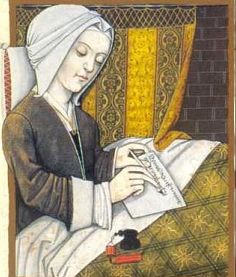237. Begin the Beguine: Hadewijch and Mechthild of Magdeburg
Two Beguine authors, Hadewijch and Mechthild of Magdeburg, deploy the tropes of courtly love in vernacular writings about their mystical experiences.
Themes:
• C. Hart (trans.), Hadewijch: the Complete Works (New York: 1980).
• F. Tobin (trans.), Mechthild of Magdeburg: the Flowing Light of the Godhead (New York: 1998).
• C.W. Bynum, “Religious Women in the Later Middle Ages,” in J. Raitt (ed.), Christian Spirituality: High Middle Ages and Reformation (New York, 1987), 121-39.
• P. Dronke, Women Writers of the Middle Ages (Cambridge: 1984).
• A. Hollywood, The Soul as Virgin Wife: Mechthild of Magdeburg, Marguerite Porete and Meister Eckhart (Notre Dame: 1995).
• I. Mandrella, “Meisterinnen ohne Schüler: Philosophierende Frauen im Mittelalter,” in A. Speer and J. Baumbach (eds), Schüler und Meister (Berlin: forthcoming).
• B. McGinn, The Flowering of Mysticism: Men and Women in the New Mysticism, 1200-1350 (New York: 1998).
• A. Minnis and R. Voaden (eds), Medieval Holy Women in the Christian Tradition c.1100-c.1500 (Turnhout: 2010).
• E. Petroff (ed.), Medieval Women’s Visionary Literature (New York: 1986).
• E.A. Petroff, Body and Soul: Essays on Medieval Women and Mysticism (New York: 1994).
• S.S. Poor, Mechthild of Magdeburg and her Book: Gender and the Making of Textual Authority (Philadelphia: 2004).
• M.A. Suydam, “The Touch of Satisfaction: Visions and the Religious Experience According to Hadewijch of Antwerp,” Journal of Feminist Studies in Religion 12 (1996), 5-27.
• F. Tobin, Mechthild of Magdeburg: a Medieval Mystic in Modern Eyes (Columbia SC: 1995).







Comments
Thank you
Finally its here- ihave missed my weekly middle ages fix, thanks so much for spending so much time and effort on such a great podcast
"Access to God was gradually
"Access to God was gradually conceded to ordinary believers" - Let's be careful here. Christianity has always taught radical spiritual equality, if not necessarily equality in the modern sense of complete fluidity of social roles. I'm reading St. Clement of Alexandria right now; he says men and women are called to the exact same virtue and greatness, and even makes a list of great women philosophers! This is despite that he believed wives ought to be subordinate to their husbands and do traditional wifely duties and so on. When it came to a life of virtue and contemplation of God (which for him is synonymous with philosophy), everyone was equal.
(At some point there developed a preconception that sainthood was for priests and religious - that's true enough, and a emphasis on the universal call to holiness has had to be revived time and again, as in the 20th century with the foundation of Opus Dei and Pope St. John Paul II's canonization of many laypeople. But I just want to make clear that the potential and calling for every single Christian to have intimacy with God was not a 13th-century innovation.)
Another relevant point with regard to mysticism and gender - it is long held in the Christian tradition that all souls, whether of men or women, are feminine in relation to God. This goes back to the Song of Songs, of course.
In reply to "Access to God was gradually by Thomas Mirus
Access to God
Thanks, those are helpful remarks. I actually thought about this one when I put it in the episode and realized it was a controversial point, which is why I explicitly mentioned that it is a proposal from Bernard McGinn rather than asserting it in my own name, since I am not sure myself how sustainable the claim is. (McGinn is incidentally one of the leading scholars of medieval mysticism, though as Aquinas says arguments from authority are the weakest arguments!) I think that his point is at least plausible: though you are right that there was always a rhetoric of spiritual equality and access to God, the actual situation may or may not have matched the rhetoric. I assume that McGinn is suggesting that this period is preparing the way for the much more radically "democratic" approach to Christianity we find in the Protestant Reformation, though I don't think McGinn actually says this explicitly. Clearly there is a kind of intellectual elitism in late ancient and medieval Christianity that is challenged in the Reformation, and I think McGinn is right to say that that challenge is at least anticipated here in authors like the Beguines. Some evidence for this is the very fact that they made the established church so uncomfortable, though the full reasons for that are quite complicated. No doubt it would be too simple to see it as mere resentment at the Beguines and others taking away spiritual privileges that previously belonged only to churchmen, but this may be one of the underlying dynamics.
In reply to Access to God by Peter Adamson
though you are right that...
"...though you are right that there was always a rhetoric of spiritual equality and access to God, the actual situation may or may not have matched the rhetoric." Well, the whole point is that a Christian has access to God no matter what his or her "situation" is. Of course there's more nuances to it, but I want to drive home the point of radical spiritual equality as an actual present reality, not just an ideal, *even in the midst of oppressive structures* (assuming for a moment that the medieval structure was oppressive in some ways, as most structures are) lest we make everything about power politics. The early Christians knew full well that there were oppressive structures, inequalities or just plain differences - when Paul says "There is neither Jew nor Gentile, neither slave nor free, nor is there male and female, for you are all one in Christ Jesus," he isn't saying "That will be the case ONCE we establish utopia," but talking about something that transcends those differences and exists in the here and now, regardless. Now one would hope that recognition of spiritual equality would lead to the transformation of social structures, as indeed I think it has led Christians to do throughout history. But insofar as that process (call it "externalization"?) can take centuries where some things are concerned, I think that's where McGinn's point comes into play.
In reply to though you are right that... by Thomas Mirus
Democritization
Ok, fair enough. I think we are perhaps talking about different things: you seem to be talking about something like the innate meaning of Christianity whereas I (following McGinn) was just describing a social process from the point of view of a historian. So from the first point of view equality was arguably always part of what Christianity was/should have been committed to; from the second point of view it's an open question how much equality actually manifested itself. And the second point of view doesn't need to involve any particular stance on the "true meaning" of Christianity, or even whether there is such a thing; I will leave that to the theologians!
Middle Ages Philosophy
Just to say I've been listen to this podcast and loved it since the start. However despite knowing a fair bit about philosophy in the ancient world I had never encountered any of the material or philosophers from the medieval era. Thank you for bringing so many fascinating characters to light.
In reply to Middle Ages Philosophy by Matthew Donovan
Medieval
Thanks for being such a faithful listener! Glad you are enjoying the medieval period. I knew a lot of these figures before (Eriugena, Abelard, Aquinas...) but have learned quite a lot doing it, especially with the minor figures and just seeing how it all hangs together. I think there is something to this "no gaps" approach after all.
On Hardewijch
Hi Peter, I love the podcast!
Loving the series on medieval philsophy, although I must say that Scholastic arguments become so complex that it's difficult to follow them in this format, especially once you get to Scotus and his love of distinctions!
Just a bit of pendantry on my part, since it's been bothering me whenever you refer back to Hardewijch. As a native dutch speaker, it looks to me as though the jch at the end should be pronounced ey-k rather than itch. Am I mistaken and is this a case where medieval pronounciations change over time?
Sorry for the pendantry! Looking forward to Renaissance philosophy!
In reply to On Hardewijch by Laurens
Hadewijch
Hm, that's interesting. I would defer to you as a Dutch speaker on this one - as you might know I live in Germany so I guess I am pronouncing it in a German way for that reason, but we would have to ask an expert on medieval Germanic languages to know how it was pronounced back in the 13th century!
In reply to Hadewijch by Peter Adamson
Hadewijch
Hi Peter. I love your podcast and I love the concept, both despite and because of it being obviously impossible to realise. I do have a masters in philosophy, so it feels a bit peculiar to react to such a mundane thing as the pronunciation of Hadewijch, but I nonetheless will. Hadewijch lived in the Duchy of Brabant, so in the Southern part of the Netherlands. The pronunciation of the '-ch' bit, then, is most likely similar to the '-ch' in the name of the other subject of this episode, Mechteld. Your pronuciation of that name is spot on. It probably isn't the hard guttural 'ch' of us Northerners (similar to 'j' in Spanish and to a sound also existing in Arabic, but that I don't know how to transcribe in Latin script - 'h' or 'kh'?). It's certainly not 'k', as Laurens asserts (that would be spelled 'ck' in Middelnederlands). It also is certainly not the English 'ch' that you are using, I'm sorry to say. I'm less sure about the 'ij' in this case. Any modern Dutch speaker would, as Laurens suggests, make a sound that is similar to 'ey' in English, even though in the Netherlands this would be more of a diphthong, a sound that an English speaker would transcribe as 'aeey' (because you know German I would say 'äij), whereas in Belgium it would be a long ä (or è). When I was younger, though, the name would mostly be spelled 'Hadewych', pointing to a pronunciation as 'ee' (English orthography) or 'ie' (German/Dutch orthography). I would be curious to hear from an expert in Middelnederlands, the language she wrote in. I would also be not surprised to hear a. that they don't know and/or b. that they disagree.
In reply to Hadewijch by Onno
Which -wijch?
Ah ok thanks, that is really helpful. I guess I won't re-record the episode but I do say her name now and again so it is good to know how to say it; I will at least stick to a more "German" -ch sound.
PS: I really liked "both despite and because of it being obviously impossible to realise."
Later echoes
Very fascinating podcast. Some of the things these philosophers say strongly anticipate St. John of the Cross. Did he know of them?
There is also, interestingly, a remarkable popular song with similar themes, "Se Eu Quiser Falar com Deus" -- "If I wished to speak with God."
In reply to Later echoes by Fr. John Rickert
John of the Cross
Oh good question - I don't know, maybe someone else will see this and tell us. But I am covering John of the Cross soonish on the podcast, I'll keep my eyes out when I am reading up on him.
Add new comment